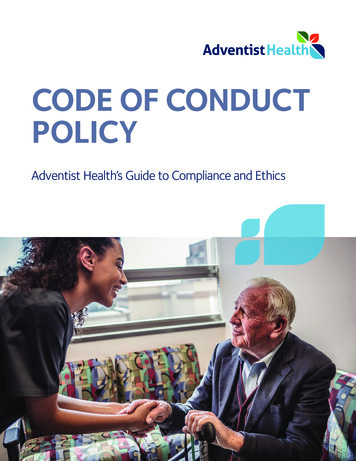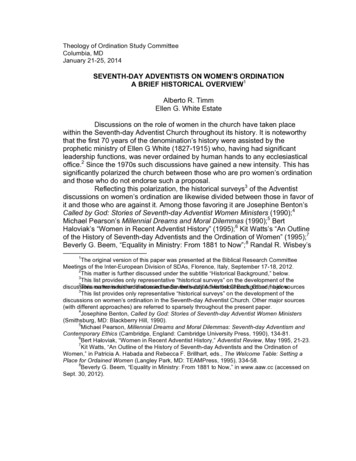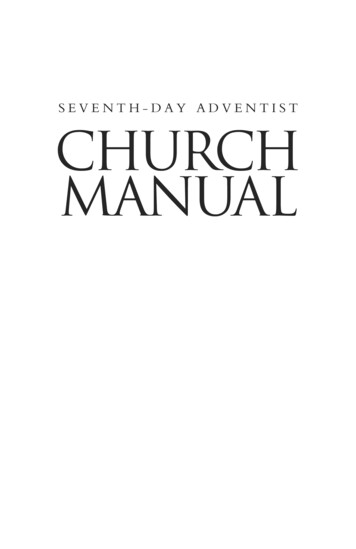
Transcription
CODE OF CONDUCTPOLICYAdventist Health’s Guide to Compliance and Ethics
Being Adventist HealthBe LoveBe a Mission OwnerLove matters. Treat yourselfwith love and care so that youare free to love and care forothers. Be trustworthy, forgivefreely and find common ground.Own your role, find your talentand know that your contribution ismission critical. Ask yourself, “Howdo I inspire health, wholenessand hope?”Be a Force for GoodBe courageous. Take action.Whether it is through your positionor your passion, work to impactyour community for the better.Be WelcomingBe BrilliantRecognize all people are createdequal and embrace them inhospitality as you would acherished friend.Leverage your best talents andskills to shine. Make promisesand keep them. Always expectthe same from others.Be CuriousSeek to understand how thingswork and why. Innovate andbe open to new ideas andapproaches. Own your mistakesand learn from them.
Adventist Health’s MissionLiving God’s love by inspiring health,wholeness and hope.Table of ContentsA Message From Our CEO1Being Adventist Health Values2Definitions3Adventist Health Compliance And Ethics Program Overview4Adventist Health Code of Conduct Policy5Ethical Conduct7Financial Responsibility9Compliance With Laws and Regulations10Fraud and Abuse15Antitrust and Trade Regulations17Workplace Considerations19Auditing And Monitoring, Inquiries,Reporting Violations, Investigations, Corrective Actions21Conclusion22Acknowledgment23Question & Answers Appendix23
A Message From Our CEODear Adventist Health colleague,I want to thank you for taking the time to review Adventist Health’s new Code of ConductPolicy. As you read through this handbook, which covers our compliance and ethics programand standards of conduct, keep in mind your role as an associate regarding patient rights,privacy, ethical conduct, fiscal responsibility and laws and regulations.Our Code of Conduct Policy aligns with our mission of Living God’s Love by inspiring health,wholeness and hope. The policy also supports our guiding principles to: Be Love, Be a Forcefor Good, Be a Mission Owner, Be Welcoming, Be Curious, and Be Brilliant. It is our truth andwe must hold each other accountable for living with integrity.If you believe you may have witnessed a potential or suspected violation of AdventistHealth’s Code of Conduct Policy, Adventist Health policy or applicable laws or regulations,please contact your supervisor. If you are not comfortable speaking to your supervisor,you can speak to your Human Performance representative or local compliance officer, theregional compliance official or call the Adventist Health compliance and privacy hotline at1-888-366-3833.Retaliation against any associate who, in good faith, reports potential or suspectedviolations will not be tolerated.I appreciate your commitment to our mission and for taking the time to review theAdventist Health’s Code of Conduct Policy.Thank you,Scott Reiner, CEO1 ADVENTIST HEALTH’S GUIDE TO COMPLIANCE AND ETHICS A Message From Our CEO
Adventist Health’s MissionLiving God’s love by inspiring health, wholeness and hope.Being Adventist Health ValuesBe LoveLove matters. Treat yourself with love and care so that you are free to love and care forothers. Be trustworthy, forgive freely and find common ground.Be A Force For GoodBe courageous. Take action. Whether it is through your position or your passion, work toimpact your community for the better.Be A Mission OwnerOwn your role, find your talent and know that your contribution is mission critical. Askyourself, “How do I inspire health, wholeness and hope?”Be WelcomingRecognize all people are created equal and embrace them in hospitality as you would acherished friend.Be CuriousSeek to understand how things work and why. Innovate and be open to new ideas andapproaches. Own your mistakes and learn from them.Be BrilliantLeverage your best talents and skills to shine. Make promises and keep them. Always expectthe same from others.2 ADVENTIST HEALTH’S GUIDE TO COMPLIANCE AND ETHICS
DefinitionsThe following definitions are used in this Code of Conduct Policy:Adventist Health includes Adventist Health Corporate and each of its subsidiaries andaffiliates, operating or business units, facilities, including all departments, services and clinicsmaintained and/or supported under a facility’s general acute care hospital or other healthfacility license, and affiliated medical group practices, as applicable.Adventist Health Corporate means Adventist Health System/West, a California nonprofitreligious corporation.Adventist Health Corporate Compliance and Privacy Executive is an AdventistHealth senior leader who oversees the system-wide Adventist Health Complianceand Ethics Program.Associate(s) means all individuals employed, or otherwise retained by Adventist Health eitherfull-time or part-time, including per diem, temporary, casual, contract labor and volunteers,including executives.Board refers to the Adventist Health Corporate board of directors.Compliance and Ethics Program refers to Adventist Health activities designed to promoteethical conduct and adherence to the laws, including, but not limited to: Designating compliance officers and committees; Drafting Adventist Health compliance policies and standards of conduct, including this“Code of Conduct Policy;” Developing and providing effective Associate compliance trainingand education; Conducting internal auditing and monitoring programs and activities; Developing and supporting effective lines of communications, including, but not limitedto, the “Adventist Health Compliance and Privacy Hotline;” Publicizing disciplinary guidelines; and Responding promptly to compliance offenses, conducting compliance investigations,and applying corrective and/or disciplinary action, if necessary.Local Compliance Official is an Associate whose job assignment includes the responsibilityand accountability for communicating, monitoring and evaluating implementation of theAdventist Health Compliance and Ethics Program in the local business unit or facility.Regional Compliance Official is an Associate who reports directly to the Adventist HealthCorporate Compliance and Privacy Executive. He/she assists in communicating the AdventistHealth Compliance and Ethics Program and monitors compliance along with overseeingcompliance and privacy initiatives in Adventist Health regions.3 ADVENTIST HEALTH’S GUIDE TO COMPLIANCE AND ETHICS Definitions
Adventist HealthCompliance And Ethics Program OverviewAdventist Health is committed to compliance with all applicable laws and standards ofconduct. Established in 1996, the Compliance and Ethics Program is intended to ensurecompliance with these laws and standards as well as to provide Associates with meaningfulguidance regarding their legal and ethical responsibilities in many business contexts.The Compliance and Ethics Program is managed by the Adventist Health CorporateCompliance and Privacy Department in Roseville, California. The Adventist HealthCorporate Compliance and Privacy Executive reports to the Adventist Health CorporateChief Executive Officer and has direct access to the Board through the Board Risk/Compliance Committee. The chairperson of the Board Risk/Compliance Committee reportsall of its oversight activities relating to risk and compliance to the full Board. RegionalCompliance Officials report directly to the Adventist Health Corporate Compliance andPrivacy Executive. Regional Compliance Officials assist in communicating the AdventistHealth Compliance and Ethics Program and monitor and oversee compliance andprivacy initiatives in Adventist Health regions as part of the Adventist Health CorporateCompliance and Privacy Department. In addition, each Adventist Health facility has adesignated Local Compliance Official, a HIPAA Privacy Official, an Information Technology(IT) Security Official and an IT Security Privacy Official, who are responsible for complianceand HIPAA Privacy oversight at the local level. Your Local Compliance Official is available toanswer questions about the Code or the Compliance and Ethics Program and receive andinvestigate reports of potential or suspected violations.The Corporate Compliance and Privacy Department’s responsibilities include (1) themanagement of the Compliance and Ethics Program, (2) reporting on operations, (3)investigating reported violations, and (4) monitoring and auditing activities to evaluatethe effectiveness of compliance activities. The primary focus is to establish and integrateseparate policies and procedures that will help Adventist Health abide by all applicable lawsand standards, while recognizing there are many regulations that impact the delivery ofhealthcare services that are managed by other departments within Adventist Health. Forexample, there are many regulatory matters that do not fall directly under the CorporateCompliance and Privacy Department’s responsibilities. The following individuals areresponsible for other significant risk areas within Adventist Health:Director, Information Security / ISO: manages ePHI security issues through the IncidentResponse Process by the Adventist Health Enterprise Technology Department’s InformationSecurity Team;Director, Accreditation, Regulatory, and Licensing: provides leadership and oversight ofregulatory matters affecting patient safety and facility licensing and accreditation;4 ADVENTIST HEALTH’S GUIDE TO COMPLIANCE AND ETHICS Program Overview
Chief Clinical Official, Care Delivery Administration: oversees clinical effectiveness andquality of care;General Counsel: provides leadership to the Office of General Counsel (OGC). TheCorporate Compliance and Privacy Department works closely with the OGC on compliancerelated matters;Human Performance Executive: oversees Adventist Health Human Performance matters;Strategy and Communication Executive, Marketing & Communication Department:provides oversight to communications and Adventist Health social media sites; andSystem Chief Quality Officer, Care Delivery Administration: provides directionon engagement and accountability in the culture of safety, identification of existingsafety opportunities with a plan for accelerated improvement, and a best practice clinicalrisk program.The Adventist Health Compliance and Ethics Program incorporates the Code as well asother Adventist Health policies, such as those governing Associate grievance procedures,accounting, auditing, etc. Associates also should review the Adventist Health EmployeeHandbook to ensure their understanding of Adventist Health’s expectations regardinga number of additional ethics and compliance-related measures, such as the handlingof conflicts, prohibitions on harassment and discrimination, protection of confidentialinformation, use of Adventist Health electronic and communications equipment/systemsand software, and use of social media.5 ADVENTIST HEALTH’S GUIDE TO COMPLIANCE AND ETHICS Program Overview
Adventist Health Code of Conduct PolicyThis Adventist Health Code of Conduct Policy (Code) sets forth Adventist Health’s guidingprinciples that our work is performed in an ethical and legal manner. These obligations apply toour relationships with patients, doctors, clients, independent contractors, vendors, regulators,consultants, and one another. The Code’s emphasis is based on our shared values, which guideand dictate appropriate conduct while performing services for Adventist Health. It is also a keycomponent of our overall Corporate Ethics and Compliance Program.Adventist Health is committed to the ideals which are reflected in our Mission, Vision and thevalues associated with “Being Adventist Health,” the Code, and our policies and procedures.Adventist Health is also committed to abiding by all applicable laws, statutes and regulationswhen we do business. We are equally committed to assuring that our actions consistentlyreflect our words. In this spirit, we expect all our Associates’ actions to reflect the highstandards set forth in the Code.No code of conduct policy can substitute for an individual’s own internal sense of fairness,honesty and integrity. Thus, in your daily life and work, if you encounter a situation or areconsidering a course of action that may be technically within the guidelines of the Code andAdventist Health’s policies and procedures, but you are concerned that the contemplated actionsimply “does not feel right,” please discuss the situation with your Local Compliance Official.Adventist Health prohibits all retaliation. There will be no retaliation for asking questions, orraising concerns about the Code, or for reporting possible improper conduct or violations.Adventist Health trusts you as a valuable member of the Adventist Health team. We ask you toassist us in supporting the values and principles that are critical to achieving our mission.The Code addresses five categories of issues that are critical to the success of AdventistHealth: ethical conduct, financial responsibility, compliance with laws and regulations,workplace considerations, and auditing and monitoring of the foregoing. The standards are notintended to be an exhaustive list of issues facing Adventist Health, but instead, are those thatare frequently encountered.6 ADVENTIST HEALTH’S GUIDE TO COMPLIANCE AND ETHICS Code of Conduct Policy
Ethical ConductGuiding PrinciplesAdventist Health is committed to the highest standards of business ethics and integrity.Associates must represent Adventist Health accurately and honestly; deal fairly withAdventist Health’s competitors, customers and vendors; treat one another with dignity,respect, and courtesy; and refrain from any false or misleading statements or any activityintended to defraud anyone of money, property or services.Expectations of the Chief Executive Officer, Chief Financial Officer,and Senior LeadersAdventist Health’s senior leadership is responsible for maintaining a culture that supports theCode. Additionally, all provisions of the Code and Employee Handbook, including those relatedto ethical conduct, conflicts of interest, compliance with the law, and internal reporting ofviolations of the Code, bind the CEO and Senior Financial Officer. The CEO and Senior FinancialOfficer also have the responsibility for full, fair, accurate, timely, and understandable disclosurein the periodic reports and submissions filed by Adventist Health with the designatedMedicare Administrative Contractors, Centers for Medicare & Medicaid Services, variousfederal and state agencies, the Internal Revenue Service, the Office of Statewide PlanningHealth and Development, and the Joint Commission, as well as in other public communicationsmade by Adventist Health. Accordingly, it is the responsibility of the CEO and each seniorleader to promptly bring to the attention of the Local Compliance Official any informationthat materially affects the disclosures made by Adventist Health it its public communications.The CEO and Senior Financial Officer also shall bring promptly to the attention of the LocalCompliance Official any information he/she may have concerning significant deficiencies inthe design or operation of internal controls that could adversely affect Adventist Health’sability to record, process, summarize, and report financial data; or any fraud, whether or notmaterial, that involves management or other Adventist Health staff who have a significant rolein Adventist Health’s financial reporting, disclosures, or internal controls.Expectations of Adventist Health LeadersWhile all Associates are obligated to follow the Code, we expect our leaders to set anexample and be role models. We expect everyone in the organization with supervisoryresponsibility to exercise that responsibility in a kind, sensitive, thoughtful and respectfulmanner. We also expect that leaders will ensure their teams have sufficient information tocomply with laws, regulations and Adventist Health policies and standards of conduct, as wellas the resources to resolve ethical dilemmas. Leaders must support a culture that promotesthe highest standards of conduct, ethics and compliance. This culture must encourage7 ADVENTIST HEALTH’S GUIDE TO COMPLIANCE AND ETHICS Ethical Conduct
everyone in the organization to share concerns immediately. Adventist Health expects thatits leaders will: Use care in screening potential Associates and act professionally and lawfully insupervising existing Associates; Take reasonable steps to ensure that Associates are familiar with the Compliance andEthics Program; Train and educate Associates adequately to comply with the requirements containedin the Code and comply with applicable laws and regulations, Adventist Health policies,standards of conduct and/or compliance directives; Maintain a work environment in which Associates feel free to ask questions and/orreport concerns about potential or suspected issues without fear of retaliation; Conduct periodic reviews to maintain the highest quality job competency and ethicalconduct; Promptly report any potential or suspected violation of the Code or any AdventistHealth policies, standards of conduct or applicable laws and regulations; and Set a proper example for Associates to follow.Expectations of AssociatesFulfillment of Adventist Health’s commitment to the Code is dependent upon the commitmentof each Associate. Adventist Health does not exist separately from its Associates and can onlyfunction through its Associates. Each member of the Board is committed to the Code and theCompliance and Ethics Program. It is expected that every Associate will adhere to the Code,and the Compliance and Ethics Program as well, by: Taking responsibility for his/her own actions; Knowing and complying with applicable laws and rules, including applicable Federalhealthcare program requirements, the Code and Adventist Health policies andstandards of conduct as they apply to his/her job responsibilities; Seeking guidance, as provided in the Code, and/or researching otherapplicable Adventist Health policies and standards of conduct when in doubtabout his/her responsibilities; Refraining from involvement in illegal, unethical or other improper acts; Promptly reporting any potential or suspected violation of the Code, Adventist Healthpolicies, standards of conduct or applicable laws or regulations; and When requested, assisting Adventist Health personnel and authorized outside personnelin investigating all allegations of violations.8 ADVENTIST HEALTH’S GUIDE TO COMPLIANCE AND ETHICS Ethical Conduct
Financial ResponsibilityAdventist Health maintains a high standard of accuracy and completeness in documenting,managing and reporting financial information. This information serves as a basis for managingour business and is important in meeting our obligations to patients, staff, suppliers, andothers. It is also necessary for compliance with tax and financial reporting obligations.Adventist Health’s books and records must not contain any false, misleading or deceptiveinformation or entries. Financial reports must fairly and consistently reflect Adventist Health’sperformance and accurately disclose the results of operations. As appropriate, they mustalso comply with generally accepted accounting principles and other applicable rules andguidelines and provide a sufficient platform on which to complete cost reports and requestsfor payment for services provided to beneficiaries of federal and state healthcare programssuch as Medicare, Medicaid/Medi-Cal and TRICARE/CHAMPUS. Each Associate, who has arole in documenting, managing and/or reporting financial information for Adventist Health, hasa personal responsibility to ensure that every document and entry is complete and accurate,and that requests for reimbursement or payments are supported by receipts, purchase ordersor other documentation as required by Adventist Health financial policies.Internal controls exist in virtually every aspect of our work and all Associates shareresponsibility for maintaining and complying with required internal controls. Moreover, infulfilling their financial reporting obligations, Associates must disclose all material facts relatedto a matter being reported, including any material fact that is necessary to ensure the reportis not false or misleading. Associates must cooperate in all audits, and may not try to influence,coerce, manipulate, or mislead any person or entity engaged to perform the audit with theintent of affecting the outcome of the audit.9 ADVENTIST HEALTH’S GUIDE TO COMPLIANCE AND ETHICS Financial Responsibility
Compliance With Laws and RegulationsAdventist Health complies with all laws and regulations affecting its business. Associatesare expected to have a practical, working knowledge of the laws and regulations affectingtheir job responsibilities. Adventist Health requires annual compliance training and providessupplemental educational materials to help inform Associates of these laws and regulations.Associates may direct questions to the Office of General Counsel or the CorporateCompliance and Privacy Department.Section 501(c)(3) RequirementsAs a Section 501(c)(3) organization, Adventist Health must engage in activities that advanceits tax-exempt purposes and ensure that its resources are not focused on advancing theprivate or personal interests of any individual. Consequently, Adventist Health strives toensure that all payments, including compensation arrangements, do not exceed fair marketvalue. Adventist Health seeks to comply with the rebuttable presumption of reasonablenessestablished under the Treasury Regulations accompanying Section 4958 of the InternalRevenue Code of 1986, as amended, and it expects that all Associates will facilitate AdventistHealth’s compliance with the relevant requirements.Patient Rights: Appropriate Care and TreatmentCare is provided in an efficient manner, consistent with our obligation to maintain quality.Patients are entitled to disclosure of charges. Patients are informed of their right to self-determination. This right respects thecompetent adult patient’s right to participate in and make his/her own healthcaredecisions after receiving his/her physician’s complete disclosure of the nature andconsequences of proposed healthcare, including significant benefits, risks andalternatives. A patient has the right to accept medical care or to refuse treatment,and to be informed of the medical consequences of such refusal. Also, additionalpatient rights apply for Medicare patients in long-term care facilities and home healthagencies, including a requirement that patients be informed of their rights in a languagethey understand.Patients are treated at all times with care, concern and respect. Patients are entitled tooptimal care, prompt and courteous responses to their requests and to their particular needsfor treatment or service. Medically necessary care is provided with the patient’s informed consent. If a patient has been declared incompetent by a court, or is assessed by his/herprimary care physician to lack the ability to understand the nature and consequencesof proposed healthcare, including significant benefits, risks and alternatives, thepatient’s agent holding power of attorney for healthcare, surrogate decision maker,10 ADVENTIST HEALTH’S GUIDE TO COMPLIANCE AND ETHICS Compliance With Laws and Regulations
conservator/guardian, next of kin or other legally authorized responsible person has anobligation to act in the best interests of the patient to the extent permitted by law. At discharge, Adventist Health facilities provide patients with information regarding theavailability of any post-hospital services they may require, consistent with applicablelaws, assuring patient choice is always appropriately maintained.Patient InformationWe are committed to ensuring confidentiality of records and related information for allpatients. Patient privacy and confidentiality of care is respected at all times in accordance withAdventist Health policy (see Employee Handbook) and the Health Insurance Portability andAccountability Act (HIPAA) requirements. We do not use, disclose or discuss patient-specificinformation, including patient financial information, with others unless it is necessary to servethe patient, at the patient’s request or required by law. Associates or Medical Staffs do not have a right to any patient information otherthan that which is necessary to perform his or her job or responsibilities. Any breachof confidentiality represents a failure to meet the professional and ethical standardsexpected and constitutes a violation of this Code. A full confidentiality statement isreceived and accepted by each Associate as part of the Adventist Health EmployeeHandbook. We also expect our vendors involved in patient care to perform andprovide services consistent with the applicable HIPAA laws. We include HIPAA BusinessAssociate language in our agreements with these vendors or separately enter intoBusiness Associate Agreements with such vendors.Adventist Health has a Privacy Manager and a team of individuals dedicated to ensuring HIPAAcompliance. If you have specific questions about Adventist Health’s HIPAA compliance status,please contact your local Privacy Official.Emergency Services (EMTALA Policy)Consistent with our commitment to the poor and underserved, any person regardless ofhis/her ability to pay is provided an appropriate medical screening examination within thecapability of each Adventist Health hospital to determine whether an emergency medicalcondition (including psychiatric medical condition) exists or, for pregnant women, active laborexists and, if so, provide appropriate stabilizing treatment and/or appropriate transfer to othermedical centers for treatment. In addition: Practices that fail to conform to this policy, commonly referred to as “dumping,” areprohibited under both federal and state laws, and carry severe penalties for AdventistHealth, its Associates and Medical Staffs. Associates must comply with Adventist Health policies on screening, stabilization andtransfer of patients. At a minimum, a person presenting to an Adventist Health hospitalis entitled to a medical screening examination in accordance with Medical Staff policies11 ADVENTIST HEALTH’S GUIDE TO COMPLIANCE AND ETHICS Compliance With Laws and Regulations
to determine whether he or she has an emergency medical condition or, in the case of apregnant woman, is in active labor, irrespective of ability to pay. If it is determined thata patient has an emergency medical condition, the patient must receive further medicalevaluation and such treatment as may be required to stabilize the medical condition,within the capabilities of the Associate and facilities available, or the patient must betransferred in a medically appropriate manner to another medical facility.Physician RelationsAdventist Health maintains proper, legal and positive working relationships between ourAssociates and physicians. Healthcare is a collaboration between Associates and MedicalStaff members. As with any collaboration, each party has important roles and responsibilities.Adventist Health is committed to providing an excellent work environment for our MedicalStaffs. Associates interact with Medical Staff in a respectful and supportive way. We requireour Medical Staffs to be familiar with, and comply with, this Code.Adventist Health is committed to providing a Medical Staff privileging process that usesuniformly applied professional criteria in a fair, prompt and reasonable manner, withoutdiscrimination on the basis of race, color, national origin, ancestry, sex, pregnancy, childbirthor related medical condition, marital status, religion, creed, physical/mental disability, medicalcondition, age, gender identity, sexual orientation or any other protected category as definedby law.Anti-Kickback and Anti-Referral LawsFederal and state laws and regulations govern the relationship between individuals and entitieswho may refer patients to Adventist Health facilities. The applicable federal laws include theAnti-Kickback Law and the Stark Law. The Office of General Counsel and the CorporateCompliance and Privacy Department have developed a comprehensive program to ensurecompliance with such federal and state anti-kickback and anti-referral laws. Consistent withAdventist Health’s strategic direction, the intent of the program is to provide standardizationof physician contracting and consistency of legal interpretation, with the ultimate goal ofproviding an efficient framework to contract with physicians and engage with providers andsuppliers in compliance with applicable laws.Contracting with PhysiciansIt is important that Associates who interact with physicians (particularly those Associates whomake payments to physicians for services rendered, provide space or services to physicians,recruit physicians to the community, and/or arrange for physicians to serve in leadershippositions in the organization) are aware of the requirements of the laws, regulations, andpolicies that address relationships between Adventist Health and physicians. If relationshipswith physicians are properly structured, but not diligently administered, such failure toadminister the arrangements, as agreed, results in a violation of the law. Any arrangement12 ADVENTIST HEALTH’S GUIDE TO COMPLIANCE AND ETHICS Compliance With Laws and Regulations
with a physician must be structured to ensure compliance with legal requirements. Mostarrangements must be in writing and approved by the Office of General Counsel. Failure tomeet all requirements of these laws and regulations can result in serious consequences.The Adventist Health policies and procedures governing physician contracts, and otherpayments to physicians, are found in the Adventist Health Physician Financial Arrangemen
I want to thank you for taking the time to review Adventist Health's new Code of Conduct Policy. As you read through this handbook, which covers our compliance and ethics program and standards of conduct, keep in mind your role as an associate regarding patient rights, privacy, ethical conduct, fiscal responsibility and laws and regulations.










